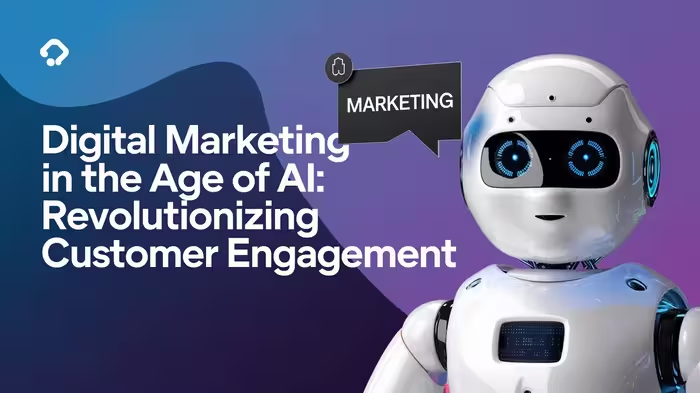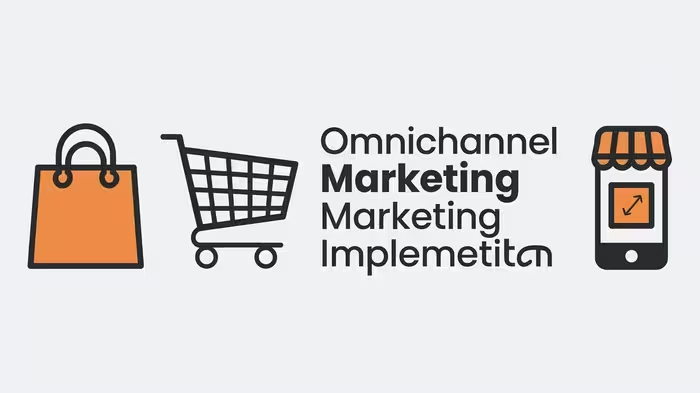In a world where technology evolves at breakneck speed, digital marketing stands at the forefront of innovation. And now, a new player has entered the game, promising to revolutionize how we connect with customers: Artificial Intelligence (AI).
But what does this mean for marketers? How can we harness the power of AI to create more impactful, efficient, and personalized campaigns? Buckle up, because we’re about to embark on a journey through the exciting landscape of AI-powered digital marketing.
Understanding AI in Digital Marketing
Before we dive into the nitty-gritty, let’s get our bearings. What exactly do we mean when we talk about AI in marketing?
Definition of AI in Marketing Context
At its core, AI in marketing refers to the use of intelligent computer systems to make data-driven decisions and predictions about customer behavior, preferences, and needs. It’s like having a super-smart assistant that can analyze vast amounts of data in seconds and provide actionable insights.
Key AI Technologies Used in Marketing
The AI umbrella covers a range of technologies, each with its own superpowers:
- Machine Learning: The ability to learn and improve from experience without being explicitly programmed.
- Natural Language Processing (NLP): Understanding and generating human language.
- Computer Vision: Analyzing and understanding visual information.
- Deep Learning: Advanced neural networks capable of processing complex patterns.
The Impact of AI on Traditional Marketing Strategies
AI isn’t just a new tool in the toolbox – it’s reshaping the entire workshop. Traditional marketing strategies are being transformed:
- From gut feelings to data-driven decisions
- From one-size-fits-all to hyper-personalization
- From reactive to predictive marketing
AI-Powered Marketing Channels
Now that we’ve got the basics down, let’s explore how AI is revolutionizing different marketing channels.
Social Media Marketing
Remember the days of manually scheduling posts and guessing the best times to publish? Those days are long gone. AI now powers:
- Content recommendations: Suggesting what type of content will resonate with your audience.
- Optimal posting times: Analyzing user behavior to determine when your audience is most active.
- Automated social listening: Monitoring brand mentions and sentiment across platforms.
Email Marketing
Email might be old school, but AI is giving it a modern makeover:
- Subject line optimization: Crafting subject lines that are more likely to be opened.
- Send time optimization: Determining the best time to send emails to individual subscribers.
- Dynamic content: Personalizing email content based on user behavior and preferences.
Content Marketing
Content is king, but AI is the kingmaker:
- Topic generation: Suggesting trending topics and content ideas.
- Content optimization: Analyzing and suggesting improvements for SEO and readability.
- Automated content creation: Generating basic reports, product descriptions, and even articles (but don’t worry, we human writers still have our place!).
Search Engine Optimization (SEO)
AI is changing the SEO game in significant ways:
- Keyword research: Identifying valuable keywords and content gaps.
- Content optimization: Suggesting improvements to make content more search-engine friendly.
- SERP analysis: Understanding search intent and optimizing for featured snippets.
Personalization and Customer Experience
In the age of AI, one-size-fits-all marketing is as outdated as a flip phone. Let’s dive into how AI is personalizing the customer experience.
AI-Driven Customer Segmentation
Gone are the days of broad demographic segmentation. AI allows us to create micro-segments based on behavior, preferences, and even predictive future actions. It’s like having a crystal ball that actually works!
Hyper-Personalized Content Creation
Imagine serving each customer content that feels like it was created just for them. With AI, this dream is becoming a reality:
- Product recommendations based on browsing history and purchase behavior
- Personalized email content that changes based on the recipient’s interests
- Dynamic website content that adapts to the user’s preferences
Chatbots and Conversational AI
AI-powered chatbots are revolutionizing customer service and engagement:
- 24/7 availability: Providing instant responses at any time of day.
- Personalized interactions: Remembering customer preferences and history.
- Scalability: Handling multiple conversations simultaneously.
Predictive Analytics and Decision Making
One of AI’s superpowers is its ability to predict the future (well, kind of). Let’s see how this is changing marketing decision-making.
Customer Behavior Prediction
By analyzing past behavior, AI can predict:
- Likelihood of purchase
- Potential churn risks
- Lifetime customer value
This allows marketers to tailor their strategies to individual customer journeys.
Trend Forecasting
AI doesn’t just look at the past; it can spot emerging trends before they hit the mainstream. This gives marketers a competitive edge in creating timely, relevant content and campaigns.
Real-Time Optimization of Marketing Campaigns
Imagine a marketing campaign that optimizes itself in real-time based on performance data. With AI, this is possible:
- Adjusting ad bids automatically
- Reallocating budget to high-performing channels
- Tweaking messaging based on audience response
AI in Advertising
The world of advertising is being turned on its head by AI. Let’s explore how.
Programmatic Advertising
AI-driven programmatic advertising is like having a super-efficient media buyer working 24/7:
- Real-time bidding on ad placements
- Targeting ads to the right audience at the right time
- Optimizing ad spend across multiple platforms
Dynamic Ad Creation
Say goodbye to static ads. AI can now create dynamic ads that change based on:
- User demographics
- Past behavior
- Current context (like weather or location)
Ad Placement Optimization
AI doesn’t just create ads; it finds the best places to put them:
- Identifying the most effective ad placements
- Optimizing for different devices and formats
- Balancing reach and frequency for maximum impact
Voice Search and AI Assistants
“Hey Siri, how is AI changing voice search?” Let’s find out.
Optimizing for Voice Search
With the rise of smart speakers and voice assistants, optimizing for voice search is crucial:
- Focusing on natural language and question-based queries
- Optimizing for featured snippets and position zero
- Creating content that answers specific questions
Marketing Through AI Assistants
AI assistants like Siri, Alexa, and Google Assistant are becoming new marketing channels:
- Creating voice apps and skills
- Optimizing for voice commerce
- Providing valuable information through voice interfaces
Voice-Activated Shopping
“Alexa, add milk to my shopping list.” Voice-activated shopping is here, and it’s changing how consumers interact with brands:
- Optimizing product names and descriptions for voice search
- Creating voice-friendly shopping experiences
- Integrating with popular voice assistant platforms
AI-Enhanced Customer Insights
AI is like a mind-reader for your customers. Let’s see how it’s enhancing our understanding of customer behavior.
Sentiment Analysis
AI can analyze text, voice, and even facial expressions to understand customer sentiment:
- Monitoring social media for brand sentiment
- Analyzing customer service interactions
- Gauging reaction to new products or campaigns
Social Listening
AI-powered social listening tools can monitor vast amounts of social media data to:
- Identify emerging trends
- Spot potential PR issues before they escalate
- Understand competitor strategies
Customer Journey Mapping
AI can create detailed, data-driven customer journey maps:
- Identifying key touchpoints and pain points
- Predicting likely next steps in the customer journey
- Suggesting personalized interventions to guide customers towards conversion
Challenges and Ethical Considerations
It’s not all roses in the world of AI marketing. Let’s look at some of the thorny issues we need to navigate.
Data Privacy Concerns
With great data comes great responsibility:
- Ensuring compliance with data protection regulations like GDPR
- Being transparent about data collection and use
- Balancing personalization with privacy
Job Displacement in Marketing
As AI takes over more marketing tasks, what does this mean for human marketers?
- The changing role of marketers in an AI-driven landscape
- The need for new skills and adaptability
- The importance of creativity and strategic thinking
Transparency in AI-Driven Marketing
As AI becomes more prevalent, there’s a growing need for transparency:
- Disclosing the use of AI in customer interactions
- Explaining how AI-driven decisions are made
- Addressing algorithmic bias and fairness
The Future of AI in Digital Marketing
What does the crystal ball show for the future of AI in marketing? Let’s take a peek.
Emerging AI Technologies
The AI revolution is just getting started. Keep an eye on:
- Quantum computing for even more powerful data processing
- Advanced natural language generation for content creation
- Emotional AI for even deeper customer understanding
Integration of AI with Other Technologies
AI doesn’t exist in a vacuum. Its true power comes from integration with other technologies:
- AI + AR/VR for immersive marketing experiences
- AI + IoT for real-time, context-aware marketing
- AI + Blockchain for transparent, secure data management
The Role of Human Marketers in an AI-Driven Landscape
As AI takes over more tasks, the role of human marketers will evolve:
- Focusing on strategy and creativity
- Interpreting AI insights and making nuanced decisions
- Bringing the human touch to customer interactions
Implementing AI in Your Marketing Strategy
Ready to jump on the AI bandwagon? Here’s how to get started.
Assessing Your AI Readiness
Before diving in, take stock of your current situation:
- Evaluate your data infrastructure
- Assess your team’s AI skills and knowledge
- Identify key areas where AI could have the biggest impact
Choosing the Right AI Tools and Platforms
With so many AI tools out there, how do you choose?
- Define your specific needs and goals
- Research and compare different AI marketing platforms
- Start small and scale up as you see results
Training and Upskilling Your Team
AI is only as good as the humans working alongside it:
- Provide AI and data literacy training
- Encourage a culture of continuous learning
- Foster collaboration between marketers and data scientists
Case Studies: Successful AI Marketing Campaigns
Let’s look at some real-world examples of AI marketing success.
E-commerce Personalization Success
An online retailer implemented AI-driven product recommendations, resulting in:
- 35% increase in average order value
- 28% improvement in customer retention
- 50% reduction in cart abandonment rate
AI-Driven Content Marketing Breakthrough
A B2B software company used AI for content creation and optimization:
- 300% increase in organic traffic
- 150% boost in lead generation
- 40% reduction in content production costs
Predictive Analytics in B2B Lead Generation
A manufacturing company leveraged AI for lead scoring and nurturing:
- 45% increase in qualified leads
- 30% reduction in sales cycle length
- 25% improvement in close rates
Conclusion
As we’ve seen, AI is not just changing the game of digital marketing – it’s creating a whole new playing field. From hyper-personalization to predictive analytics, from voice search optimization to AI-generated content, the possibilities are as exciting as they are vast.
But remember, AI is a tool, not a magic wand. It’s most powerful when combined with human creativity, strategic thinking, and emotional intelligence. As marketers, our role is evolving. We’re becoming interpreters, strategists, and ethical guardians in this new AI-driven landscape.
So, are you ready to embrace the AI revolution in digital marketing? The future is here, and it’s learning, adapting, and optimizing in real-time. Don’t get left behind – start exploring how AI can supercharge your marketing efforts today. The only limit is your imagination (and maybe your data infrastructure, but that’s a problem for another day).
FAQs
- Is AI going to replace human marketers?
While AI is taking over many routine tasks, it’s unlikely to completely replace human marketers. Instead, the role of marketers is evolving to focus more on strategy, creativity, and interpreting AI insights. Human empathy, emotional intelligence, and complex problem-solving are still crucial in marketing. - How can small businesses leverage AI in their marketing efforts?
Small businesses can start with AI-powered tools that are accessible and affordable, such as:
- AI-driven social media management platforms
- Email marketing tools with AI-powered personalization
- Chatbots for customer service
- AI-powered content optimization tools for SEO
Start small, focus on areas that will have the biggest impact, and scale up as you see results.
- What are the potential risks of relying too heavily on AI in marketing?
Some potential risks include:
- Over-reliance on data, leading to a lack of creative or “out-of-the-box” thinking
- Privacy concerns and potential backlash if customers feel their data is being misused
- Algorithmic bias leading to unfair or discriminatory marketing practices
- Loss of the human touch in customer interactions
It’s important to maintain a balance between AI-driven insights and human judgment.
- How is AI changing the skills required for a career in digital marketing?
Marketers now need a blend of traditional marketing skills and new, tech-focused abilities:
- Data analysis and interpretation
- Basic understanding of AI and machine learning concepts
- Ability to work with AI tools and platforms
- Strong analytical and strategic thinking skills
- Creativity to complement and enhance AI-driven insights
Continuous learning and adaptability are key in this rapidly evolving field.
- Can AI really understand and replicate human creativity in marketing?
While AI can analyze trends, generate content, and optimize campaigns, truly creative and innovative thinking is still the domain of humans. AI is excellent at processing vast amounts of data and identifying patterns, but it lacks the human ability to make unexpected connections, understand subtle cultural nuances, or create truly original ideas. The most effective marketing strategies combine AI’s analytical power with human creativity and intuition.


